Education
Normandeau School opens Passive Solar Greenhouse
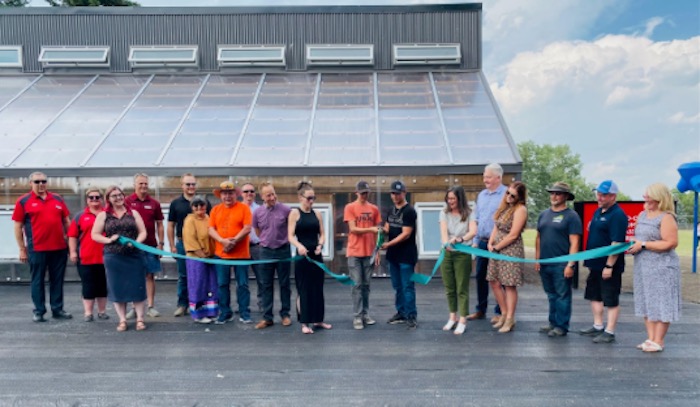
Normandeau School enjoying all that new Passive Solar Greenhouse has to offer
Close your eyes and imagine what it feels like to be in a greenhouse. The warmth in the air, the smell of dirt and budding plants, the feel of playing in the dirt, and the visual of lots of luscious green growth. The immediate uplifting feeling one gets when walking into a greenhouse is hard to describe, but simply put, greenhouses are a happy place.
Students at Normandeau School get to experience all that a greenhouse offers as construction has been completed on the new Come Grow With Us Passive Solar Greenhouse, a project totalling over $250,000 that utilizes the latest building technologies and has the potential to change the greenhouse industry in Alberta. The concept for the idea began in 2018, with construction taking place last fall. Earlier this week, a grand opening was held which included a free community barbeque hosted by the Central Alberta Co-op, as well as free family activities such as learning about different types of garden boxes, planting flowers, and face painting.
“The greenhouse has created a living classroom for students to apply traditional knowledge in a hands-on environment while learning practical life skills,” said Kim Kirkwood, Principal at Normandeau School. “This is a learning environment that no other school has, and it engages students from Pre- Kindergarten to Grade 8.”
Every teacher at Normandeau will dedicate time to the project to ensure curriculum is infused into the greenhouse so authentic and enriched learning opportunities happen for all students from Pre-Kindergarten to Grade 8. The greenhouse will allow students to learn how food grows as well as use Math, Science, and Language Arts curriculum throughout the process.
This project will use leading edge sustainable building technologies, reduce the school’s carbon footprint, and allow students to learn valuable life skills. The project is a sustainable, low impact, cost effective greenhouse targeting four seasons, which will apply solar energy technologies, have an open sourced, printable design that other schools and community groups can utilize, which will also have the potential to change the greenhouse industry in Alberta through applied research in conjunction with SAIT Green Building Technologies.
“We are grateful for the many partnerships that have evolved as a result of the Come Grow With Us Passive Solar Greenhouse,” said Kim. “This project would not have been possible without their support. We appreciate each sponsor’s commitment to the lives of kids through their support of the greenhouse.”
Red Deer
Judge upholds sanctions against Red Deer Catholic school trustee who opposed LGBT agenda
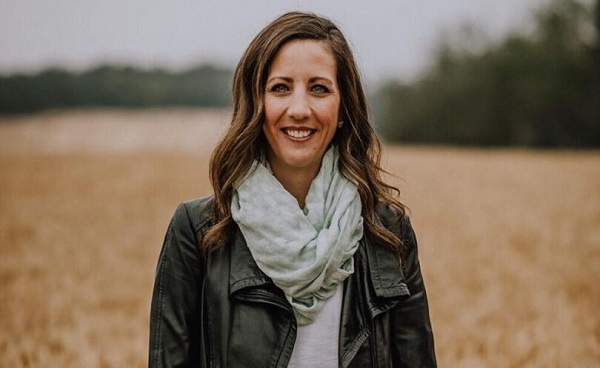
From LifeSiteNews
Monique LaGrange was ousted last December from the Red Deer Catholic Regional Schools’ board for comparing the LGBT agenda targeting children to brainwashing.
A Canadian judge ruled that a school board was justified to place harsh sanctions on a Catholic school trustee forced out of her position because she opposed extreme gender ideology and refused to undergo LGBT “sensitivity” training.
Justice Cheryl Arcand-Kootenay of the Court of King’s Bench of Alberta ruled Thursday that the Red Deer Catholic Regional Schools (RDCRS) Board’s sanctions placed against former trustee Monique LaGrange will stand.
LaGrange had vowed to fight the school board in court, and it remains to be seen if she can take any further actions after the decision by Judge Arcand-Kootenay.
The judge ruled that the RDCRS’s policies in place for all trustees, which the board contended were breached, were “logical, thorough, and grounded in the facts that were before the Board at the time of their deliberations.”
As reported by LifeSiteNews, the RDCRS board voted 3-1 last December to disqualify LaGrange after she compared the LGBT agenda targeting kids with that of “brainwashing” Nazi propaganda. As a result of being voted out, LaGrange later resigned from her position.
The former school board trustee initially came under fire in September 2023 when she posted an image showing kids in Nazi Germany waving swastika flags during a parade to social media, with the bottom of the post showing an image of kids waving LGBT “Pride” flags along with the text: “Brainwashing is brainwashing.”
After her post went viral, calls for her to step down grew from leftist Alberta politicians and others. This culminated in her removal as director of the Alberta Catholic School Trustees’ Association (ACSTA).
In September 2023, the RDCRS passed a motion to mandate that LaGrange undergo “LGBTQ+” and holocaust “sensitivity” training for her social media post.
LaGrange, however, refused to apologize for the meme or undergo “sensitivity” training.
She had argued that the RDCRS had no right to issue sanctions against her because they were not based on the Education Act or code of conduct. Arcand-Kootenay did not agree with her, saying code of conduct violations allow for multiple sanctions to be placed against those who violate them.
Education
‘Grade inflation’ gives students false sense of their academic abilities
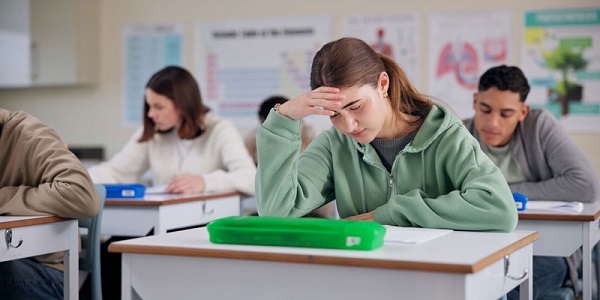
From the Fraser Institute
The average entrance grade at the University of British Columbia is now 87 per cent, up from 70 per cent only 20 years ago. While this is partly because the supply of available university spots has not kept pace with growing demand, it’s also likely that some B.C. high schools are inflating their students’ grades.
Suppose you’re scheduled for major heart surgery. Shortly before your surgery begins, you check into your surgeon’s background and are pleased to discover your surgeon had a 100 per cent average throughout medical school. But then you learn that every student at the same medical school received 100 per cent in their courses, too. Now you probably don’t feel quite as confident in your surgeon.
This is the ugly reality of “grade inflation” where the achievements of everyone, including the most outstanding students, are thrown into question. Fortunately, grade inflation is (currently) rare in medical schools. But in high schools, it’s a growing problem.
In fact, grade inflation is so prevalent in Ontario high schools that the University of Waterloo’s undergraduate engineering program uses an adjustment factor when evaluating student applications—for example, Waterloo might consider a 95 per cent average from one school the equivalent of an 85 per cent average from another school.
Grade inflation is a problem in other provinces as well. The average entrance grade at the University of British Columbia is now 87 per cent, up from 70 per cent only 20 years ago. While this is partly because the supply of available university spots has not kept pace with growing demand, it’s also likely that some B.C. high schools are inflating their students’ grades.
Sadly, grade inflation is so rampant these days that some school administrators don’t even try to hide it. For example, earlier this year all students at St. Maximilian Kolbe Catholic High School in Aurora, Ontario, received perfect marks on their midterm exams in two biology courses and one business course—not because these students had mastered these subjects but because the York Catholic District School Board had been unable to find a permanent teacher at this school.
The fact that a school board would use grade inflation to compensate for inadequate instruction in high school tells us everything we need to know about the abysmal academic standards in many schools across Canada.
And make no mistake, student academic performance is declining. According to results from the Programme for International Assessment (PISA), math scores across Canada declined from 532 points in 2003 to 497 points in 2022 (PISA equates 20 points to one grade level). In other words, Canadian students are nearly two years behind on their math skills then they were 20 years ago. While their high school marks are going up, their actual performance is going down.
And that’s the rub—far from correcting a problem, grade inflation makes the problem much worse. Students with inflated grades get a false sense of their academic abilities—then experience a rude shock when they discover they aren’t prepared for post-secondary education. (According to research by economists Ross Finnie and Felice Martinello, students with the highest high school averages usually experience the largest drop in grades in university). Consequently, many end up dropping out.
Grade inflation even hurts students who go on to be academically successful because they suffer the indignity of having their legitimate achievements thrown into doubt by the inflated grades of other students. If we want marks to have meaning, we must end the practise of grade inflation. We do our students no favours when we give them marks they don’t really deserve.
Just as our confidence in a surgeon would go down if we found out that every student from the same medical school had a 100 per cent average, so we should also question the value of diplomas from high schools where grade inflation is rampant.
Author:
-

 Economy12 hours ago
Economy12 hours agoCOP 29 leaders demand over a $1 trillion a year in climate reparations from ‘wealthy’ nations. They don’t deserve a nickel.
-

 Alberta10 hours ago
Alberta10 hours agoOn gender, Alberta is following the science
-

 Energy11 hours ago
Energy11 hours agoOttawa’s proposed emission cap lacks any solid scientific or economic rationale
-

 Brownstone Institute1 day ago
Brownstone Institute1 day agoFirst Amendment Blues
-
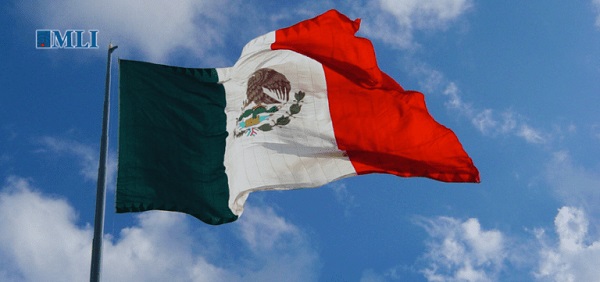
 Crime2 days ago
Crime2 days agoMexican cartels are a direct threat to Canada’s public safety, and the future of North American trade
-

 Business1 day ago
Business1 day agoDEI gone?: GOP lawmakers prep to clean house in federal government
-
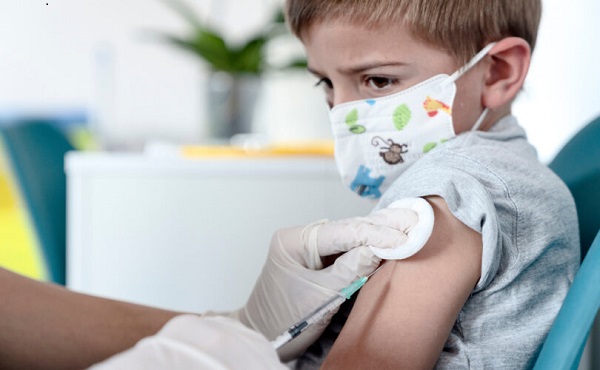
 Alberta1 day ago
Alberta1 day agoAlberta mother accuses health agency of trying to vaccinate son against her wishes
-
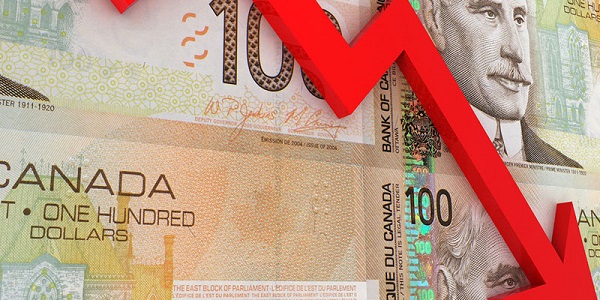
 Alberta2 days ago
Alberta2 days agoAlberta’s fiscal update projects budget surplus, but fiscal fortunes could quickly turn





